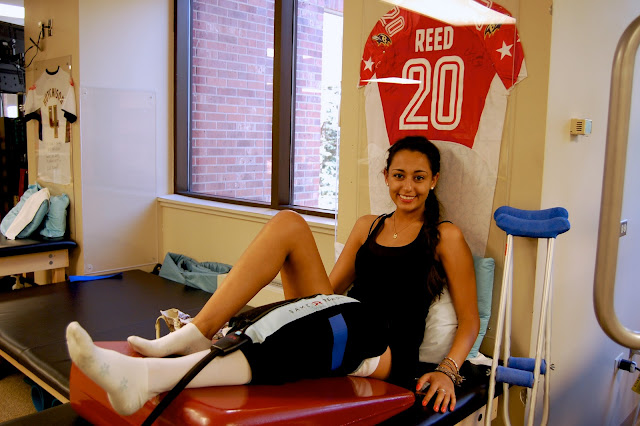I know this is MONTHS later ...
but I wanted to talk about the PT after I was finished.
So the day after surgery you hit the ground running at
Howard Head.
Those guys are really serious.
You get a schedule of more appointments than you care to attend
and next thing you know your next two weeks (at least) in Vail are entirely booked.
I had PT twice a day for a few hours each time.
Every case varies from what I understand.
The physical therapists there were amazing.
Each and every one I had was great
and you learn to love them
when they are the only ones who will touch your
nasty,
un-bathed,
un-shaved,
you-didn't-know-your-legs-still-grew-hair-like-that
legs.
They stretch you and ice you and make your injury ... well ...
HURT.
It doesn't feel good at first but that's ok.
The only part that feels good is this thing they do where they move around your new and improved knee cap for about ten minutes to reduce swelling.
It's strange watching someone play with your knee cap like it is putty but it feels good.
You would think the ice feels good, but it was FREEZING.
And you really have to do it religiously.
See this smile ...
See this smile ...
Yeah, IT'S FAKE.
You'll live.
Barely.
At first the PT is really embarrassing.
You are doing what seem like the simplest activities:
wall slides,
leg lifts ...
LAMENESS ...
and you can't even do them.
You're sitting there thinking,
"I played D1 and I can't even lift my leg now?"
They tell you to flex and there's nothing there.
You start wondering if the doc cut out your whole muscle.
It's pathetic.
Then things get serious ...
You start biking ...
at about 1mph.
PT moves a little slow, but each day it does get better.
You do a variety of activities to regain
initial strength
weight bearing strength
and agility
as well as upping cardio throughout the whole process
and eventually reaching high level activities.
I was on crutches for a solid two weeks.
Stairs were the hardest daily obstacle and I tried to avoid long walks.
When off of crutches I moved pretty slow but I got around.
I couldn't even think about walking/jogging for a month and a half.
When I did I took it REALLY slow.
(and this is all coming from someone who was very religious about the PT)
I wore high heels after 2 and a half months
(though they recommend waiting longer).
The cost of fashion ... I swear.
My incisions healed up amazingly.
Almost too amazingly.
I barely have a battle wound or anything.
In September I tried to swim, which was surprisingly impossible.
There was some muscle in my new knee that just didn't like swimming.
I worked that a lot as soon as I was aware, and it was fine after about a month.
After 4-5 months I was back in action.
Full action.
This November I went skiing again and didn't feel a thing :)
I'm never worried about my knee ...
it is better than ever :)
Next semester I'll be playing softball and I plan to ski all winter long.







3 comments:
I just had the same surgery two weeks ago. I am in physical therapy three times a week. I was out a year before the surgery with left kneecap pain. My physical therapist says he expects a full recovery. Have you continued to have a positive result after your surgery?
Hi Jane -
It has now been four years and I have had GREAT results.
My day to day knee ability is better than it ever was and I'd rate it at a 100% full recovery. If I do something VERY strenuous - i.e. hike more than 10 miles, ski every day for 7+ days straight, etc. I will brace it. I have noticed some slight swelling and discomfort if I push it TOO far so I make an effort to brace it before it gets to that point and I don't have any issues.
Important to note: while I ended physical therapy after what was recommended post surgery, I do remain very active and in shape and I believe that has an effect on the positive results I've seen. I'm not some extreme athlete but I now live in Utah where I practice yoga, hike with my dogs regularly, ski all winter, snow shoe, etc. The yoga especially has improved my mobility, and all of these activities have allowed me to keep leg strength that I believe makes a difference to how well my joints function.
Post a Comment